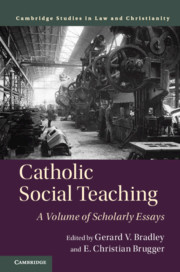Book contents
- Catholic Social Teaching
- Law and Christianity
- Frontispiece
- Catholic Social Teaching
- Copyright page
- Dedication
- Contents
- Contributors
- Acknowledgments
- Abbreviations
- Introduction Contingency, Continuity, Development, and Change in Modern Catholic Social Teaching
- Part I Historical Background
- 1 Aquinas as a Primary Source of Catholic Social Teaching
- 2 The Nineteenth-Century Historical and Intellectual Context of Catholic Social Teaching
- Part II Leo XIII to Francis: The Documentary Tradition
- Part III Themes in Catholic Social Teaching
- Part IV Evaluative and Critical Reflections
- Bibliography
- Index of Names and Subjects
- Index of Ecclesiastical Texts
1 - Aquinas as a Primary Source of Catholic Social Teaching
from Part I - Historical Background
Published online by Cambridge University Press: 12 July 2019
- Catholic Social Teaching
- Law and Christianity
- Frontispiece
- Catholic Social Teaching
- Copyright page
- Dedication
- Contents
- Contributors
- Acknowledgments
- Abbreviations
- Introduction Contingency, Continuity, Development, and Change in Modern Catholic Social Teaching
- Part I Historical Background
- 1 Aquinas as a Primary Source of Catholic Social Teaching
- 2 The Nineteenth-Century Historical and Intellectual Context of Catholic Social Teaching
- Part II Leo XIII to Francis: The Documentary Tradition
- Part III Themes in Catholic Social Teaching
- Part IV Evaluative and Critical Reflections
- Bibliography
- Index of Names and Subjects
- Index of Ecclesiastical Texts
Summary
Aquinas did not speak of “social” teaching, but did synthesize the teaching of the prophets, the Lord, the Fathers, and sound philosophy concerning social matters and responsibilities. He would have regarded the principles of CST as part of the Church’s doctrine of faith and morality (de fide et moribus), insofar as morality – the living out of that faith which consists in true beliefs about the Creator – embodies the principles, precepts, and virtue(s) of justice. For among the cardinal virtues, justice is the one bearing on those of our choices that relate to or impact on other persons, especially persons with whom in one way or another we are associated. And Aquinas’s treatment of justice, mainly but not only in his Summa Theologiae, is very extensive and detailed. This chapter offers (1) an overview of his significance for CST, (2) a review of the appeals to his writings in Rerum novarum and some of its antecedents and successors, and (3) his contribution to some leading features of CST since then, including dignity and equality; private property and associations; “subsidiarity” and the service conception of authority and law; and “solidarity” (local and global).
Keywords
- Type
- Chapter
- Information
- Catholic Social TeachingA Volume of Scholarly Essays, pp. 11 - 33Publisher: Cambridge University PressPrint publication year: 2019

